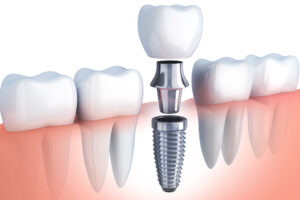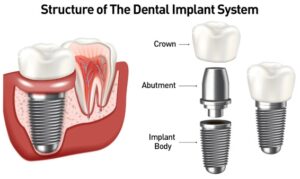What is a dental implant?
The dental implant is basically analogous to the root of a natural tooth, which is surgically inserted into alveolar bone, followed by the fabrication of the prosthesis.


Understanding about Dental Implants!
Dental implants are made of titanium or titanium alloys. These are the most commonly used materials, are biocompatible, are well tolerated by the body, and can integrate effectively with bone. In some cases, dental implants may also be made from zirconia, a type of ceramic that is a metal-free alternative, and they have great aesthetic qualities and biocompatibility. Dental implants serve as a stable foundation for replacement teeth, such as crowns, bridges, or dentures.

Implant Fixture:
The actual implant, which is inserted into the jawbone, acts as the root of the artificial tooth.
Abutment:
A connector is placed on top of the implant fixture to hold and support the crown or bridge. Crown: The visible part of the tooth, usually made of porcelain or ceramic, which is attached to the abutment.
Benefits of Dental Implants:
Dental implants provide a numerous benefits to your teeth compared to other tooth replacement options such as dentures or bridges , they also provide a secure, long-lasting, and aesthetically pleasing solution for tooth replacement, significantly improving both the functionality and appearance of your teeth. Some of the key advantages are
1. Natural appearance and comfort:
Dental implants look and feel like natural teeth. They are designed to match the color and shape of your natural teeth, which enhances your overall smile. Since dental implants are part of your jawbone, they eliminate the discomfort associated with removing dentures. They fit securely and comfortably in the mouth.
2 .Durability and longevity:
Implants are highly durable and can last many years. years, often a lifetime, with proper care. The materials used, like titanium, are very strong and biocompatible.
3. Improved oral health:
Unlike a tooth-supported bridge, dental implants do not require reducing adjacent teeth. Because nearby teeth are not altered to support the implant, more of your own teeth are left intact, which may improve long term oral health.
4. Enhanced speech:
Poorly fitting dentures can slip within the mouth, causing you to mumble or slur words. But dental implants allow you to speak clearly without the worry that teeth might slip.
5. Improved Eating:
Dental implants function like your own teeth, which will allow you to eat your favorite foods with confidence and without pain. They provide strong chewing power, similar to natural teeth.
6. Convenience:
implants eliminate the inconvenience of removing dentures, as well as the need messy adhesives to keep them in place. They are cared for Just like with natural teeth, regular brushing includes flossing.
The Dental implant procedure:
1. Initial consultation and Examination:
Before starting the implant placement, procedure, make sure you have to go a thorough dental examination by the dentist,, including x-rays and sometimes 3D imaging, to assess the jawbone’s condition and plan procedures. You should also inform your dentist about current list of medications and supplements you take. It is important to tell your dentist if you are taking a blood thinner (anticoagulant). Your dentist will decide in to coordination with your primary care provider, whether you need stop taking any medications before your implant procedure.
2. Treatment planning:
Assessment of jawbone: your dentist needs to assess your jawbone, if there is sufficient bone to support the implant. If the bone is insufficient, bone grafting may be needed.
Treatment options discussion:
Reviewing different types of implants, abutments, and crowns available, and discussing the best options for your specific situation.
Time line and cost estimation:
Outlining the stages of treatment, the time required for each stage, and the overall cost.
3. Implant Placement:
Placement: Before implant placement, a surgeon will administer a local anesthesia to numb your gums, and once you’re comfortable, your surgeon will make an incision in the gum to expose the bone. A hole is drilled into your bone, and an implant is inserted. The gum is then stitched closed over the implant.
4. Osseo integration:
After a several-month healing period, the implant undergoes osseointegration, a process where your bone grows around and fuses with the implant. This process is usually takes 3–6 months.
5. Abutment placement:
Once healing is complete, a minor surgery is performed to attach the abutment to the implant. Your gum tissue needs to be reopened to expose the implant, and the abutment is connected. Then the gum tissue is allowed to heal around the abutment for a few weeks.
6. Crown placement:
Impressions of your teeth and abutment are taken to create a custom crown. The crown should be manufactured in a dental lab to match to the color and shape of your natural teeth. Then custom made crown is to attached the abutment, which completes the implant process.
Considerations and postoperative care!
After your dental implant surgery, your surgeon will give you postoperative instructions and prescribe antibiotic medications to prevent infections. Here are several things to follow after your surgery, Take rest for the first 24-48 hours after your surgery and avoid exercises or heavy lifting for up to 72 hours. You should take all prescribed medications, such as antibiotics and painkillers. Stick to soft food and avoid hot beverages for the first few days. Jaw bone health: You should take care of your jaw bone by maintaining a balanced diet rich in vitamins and minerals to support your bone health. Commitment to oral hygiene: Brush your teeth gently twice a day with soft bristled tooth brush, and flossing regularly.
Follow-up appointments:
you should attend all scheduled follow-up visits Solitaire Family Dentistry to monitor healing and ensure that implant is integrating properly with bone.
Cost:
Dental implant costs can vary based upon the number of teeth you’re replacing, as well as extent of each procedure. The location of the dentist office may also play a role. Implants are meant to last for decades. For this reason, their sticker price is some what higher than other procedures that replace missing teeth, such as bridges and dentures. In our clinic, Solitaire Family Dentistry, Each Implant may cost around 20k–30k


